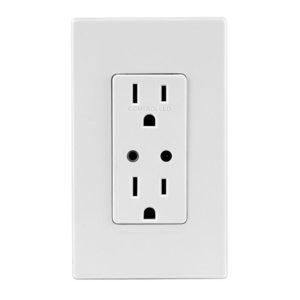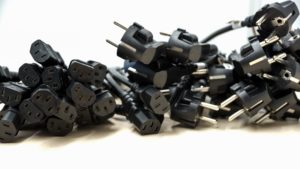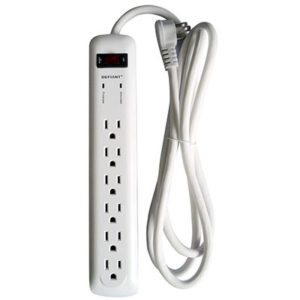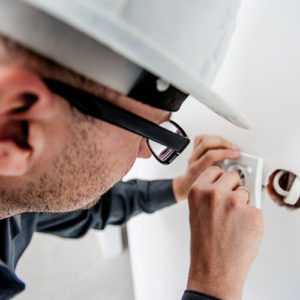04 Aug Working from Home: ACCL Electrical
WORKING FROM HOME: ACCL ELECTRICAL

Are you one of the many fortunate professionals who can work from home? Even though your home office may feel like second nature, there are still dangers to be aware of. One of these dangers is electrical systems, which include anything from outlets to power wires.
Always put your home’s electrical safety first when designing your home office. An overloaded outlet or a dangling extension cord might be dangerous if put up incorrectly. Electrical shocks and fires are just two of the many dangerous consequences of poor electrical work. Follow correct working from home safety measures to avoid injury, and always know when to call in a professional.
KEEP OUTLETS FROM BEING OVERLOADED:

It’s typical to have a number of electrical devices and appliances plugged into your outlets in today’s technology-driven society. You may realize that your outlets are becoming crowded as a result of everything from kitchen appliances to cell phone chargers. It’s risky to overload outlets, especially if you’re using a multi-plug adaptor to accommodate a big number of gadgets. Only one heat-producing electrical gadget should be connected into an outlet at a time, as a general rule.
Coffee makers, tea kettles, and hair dryers are among them. Furthermore, major appliances such as ovens, refrigerators, and washers and dryers should always be plugged directly into a wall rather than using an extension cord or adaptor.
UTILIZE WATTAGE-APPROPRIATE LIGHTBULBS:
Replacing a burned-out lightbulb is one of the most common household electrical jobs. While this is a physically simple procedure, it is critical to pay attention to the wattage needs. Fortunately, all light fixtures and lights should come with a sticker indicating the maximum power they can handle. To avoid overheating, make sure all new bulbs are under the maximum wattage. Also, make sure that any incandescent lamps have coverings to keep any items near the lamp from heating up. Consider replacing your bulbs with LEDs if you’re seeking for a more energy-efficient solution.
CORDS SHOULD NOT BE RUNNED UNDER CARPETS OR DOORS:

It’s no secret that electrical cords are ugly and can detract from an otherwise attractive space. To hide cables, you might feel compelled to bury them under rugs or run them under a door. Running a cord under a rug or carpet, on the other hand, is a severe fire hazard and should be avoided. If you’re having trouble running a cord safely, talk to an electrician about adding new outlets to place your cords within reach.
EXTENSION CORDS THAT ARE DAMAGED SHOULD BE REPLACED:

Extension cables that are frayed or damaged can be hazardous to both you and the environment. It is preferable to replace broken cords rather than try to repair them. Surges, sparks, and electrical fires will be considerably reduced with new extension cables. For further electrical safety at home while you finish your job, make sure your new cord has surge protection.
KEEP POWER EQUIPMENT AWAY FROM WATER:
Although it’s a well-known fact that electricity and water don’t mix, it’s easy to forget about this during the frenzy of house renovations. Because of the moist nature of these environments, any electrical work done in the kitchen, bathroom, or outside can be very dangerous. Check that the electricity is turned off in these areas, and that your power tools and cords are kept away from pools of water. Make sure all tools are plugged into GFCI outlets as well. These unique outlets are grounded, and if they are exposed to moisture, they will rapidly shut off.
THE TIME TO ENLIST HELP FROM A PROFESSIONAL:

Many domestic electrical projects, especially those that appear to be simple at first, can be extremely dangerous. There’s a good chance you’ll get electrocuted or start a fire. That’s why it’s critical to understand your electrical limitations and to seek the help of a qualified electrician when necessary. Burning odours, sparking outlets, and often tripped circuit breakers are examples of situations where you should seek professional electrical help.
Many people are working from home and, as a result, spending more time there. It makes sense to want to upgrade your home’s electrical system to make using all of the gadgets you need to live your life easier, safer, and more efficient. This is particularly significant if you work from home and need to run a home office from your residence. Whether you’re upgrading your outlets, replacing a lightbulb, or converting a room into a home office, keep these basic electrical safety tips in mind.
Rely on our expert ACCL Electricians:
If you’re worried about any electrical issues and require the aid of a professional, Contact us today for your free estimate!
ACCL Electrical offers repair and replacement services. We would be pleased to develop a guaranteed unique solution to keep your appliances free of obstructions and your electrical needs met be it interior or exterior. We can help. Call 1(905) 448-5909 or visit our contact page to drop us a message http://acclelectrical.ca/contact-us/





No Comments